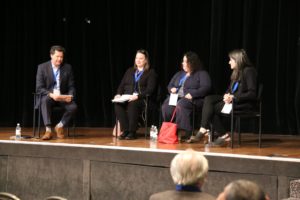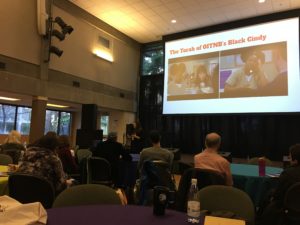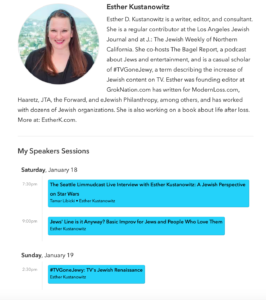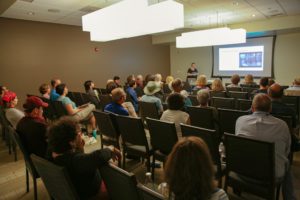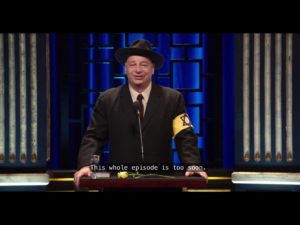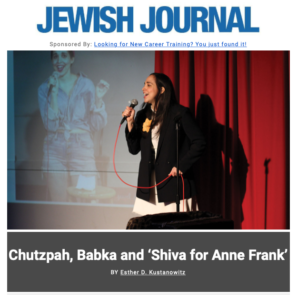
January 2020 is in the books; here’s to February!
0Thrilled to have kicked off January with two speaking engagements on subjects near and dear to my heart. (Why are things always near and dear? Because they rhyme they always have to go together?) At Limmud Seattle, I got my TVGoneJewy on, talking about Jewish representation on the big and small screen, and at the Z3 conference, I spoke on behalf of civility on social media, especially in Jewish conversations and surrounding issues relating to Israel.
The Bagel Report was back with three new episodes in 2020, tackling pop culture topics like Friends, the West Wing, Batwoman, the Oscars, other awards shows and Star Wars. Check out those episodes and subscribe here.
You can also listen to my “Star Wars and Judaism” Limmudcast below.
As always, publishing in lots of places. Here are some recent highlights:
- Jewish Emojis We Need for Today’s Jewish Identity (The Forward, paywall)
- Daf Yomi Fever: How Daily Talmud Study Is Sweeping the Nation (Jewish Journal)
- The Potential of Alternate Universes (Jewish Journal)
- After ‘The Jewish Women Turned Invisible,’ Voices are Quietly Emerging (EJewishPhilanthropy.com)
- The Logistics, Wins and Losses of Jewish Conference Inclusion (EJewishPhilanthropy.com)
In February, the Limmud tour continues with Limmud NY, President’s Day Weekend (February 14-17)– see below for sessions. You can still register to attend at limmudny.org.)
Now booking gigs for March-December 2020, so be in touch! Thanks for staying connected to the world of EstherK…

Coming in 2020 – to Seattle & Beyond!
0Ending 2019 with two bookings for January, at Limmud Seattle and the Z3 conference in Los Angeles…details and links are below.
Plus, more episodes of the Bagel Report podcast, plus articles galore (Articles Galore is my Bond Girl name) at the J and the Jewish Journal, and more!
So stay tuned and have a wonderful new year!

Introducing: The Bagel Report podcast
0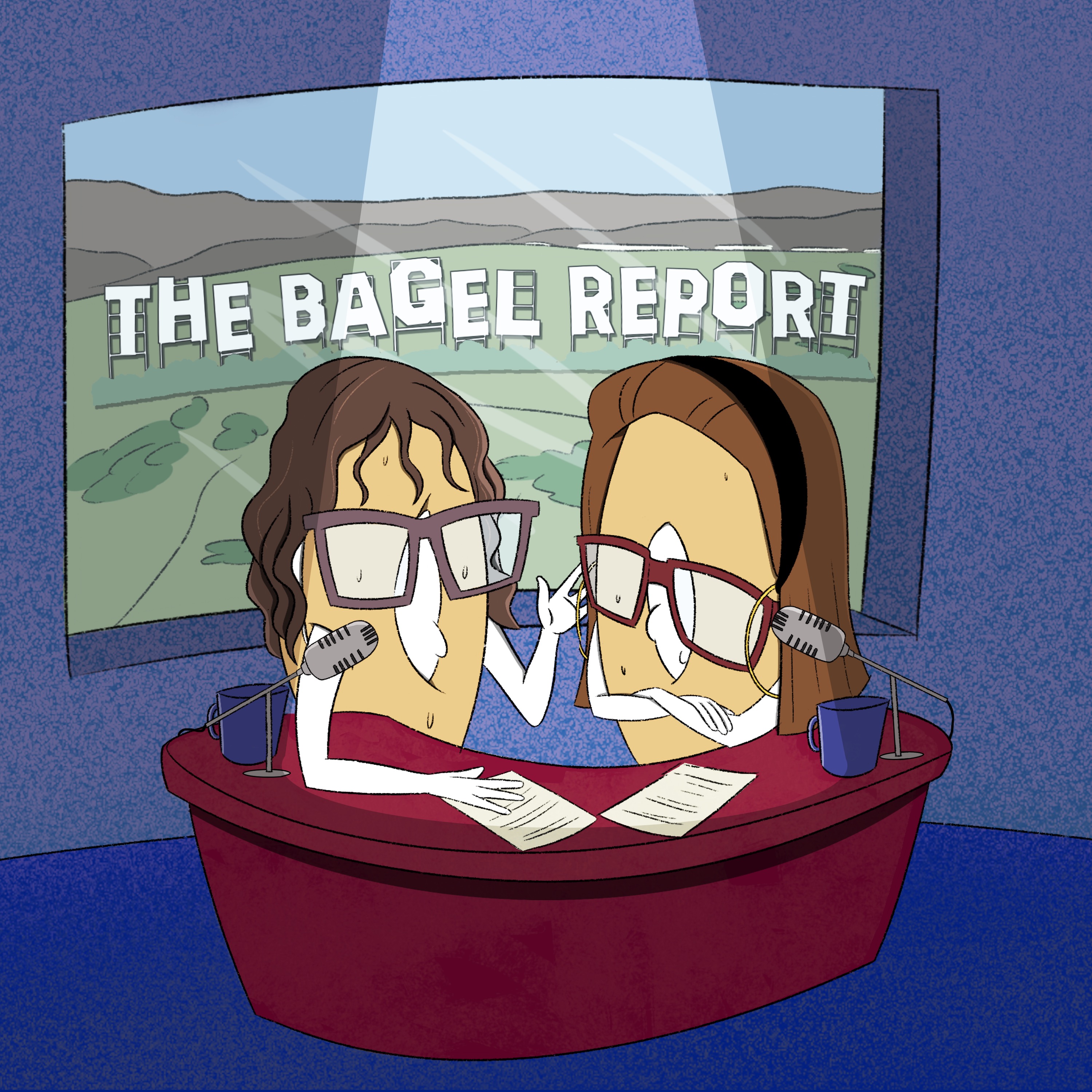
Official art, the Bagel Report, by Danny Lipsky
I’m thrilled to announce the launch of my podcast, The Bagel Report – join me and my co-host Erin Ben-Moche for our ongoing discussion of pop culture and “Jewyness”: we’d love your input as we move forward in this ever-expanding conversation. (And yes, we’re the bagels in the graphic on this post, reporting on Jewish-related Hollywood content. I’m the bagel on the right, obviously.)
Episode 5: Wonder Woman, Mrs. Maisel and beyond! But mostly Maisel. 🙂 (coming soon!!)
Episode 4: The One with the Hallmark Movie, the American Pickle & the Inappropriate Ornament
Episode 2: The Crazy Ex-Awakening of Motti and Tiffany Haddish
Episode 1: Halloween: It’s More Jewish Than You Think
Links to the podcast available at the Jewish Journal or via the following services:
iTunes
Stitcher
GooglePlay
Subscribe, add ratings or comments, or contact us with questions or ideas for future episodes!

Guesting on the I’m Not Joking Podcast
0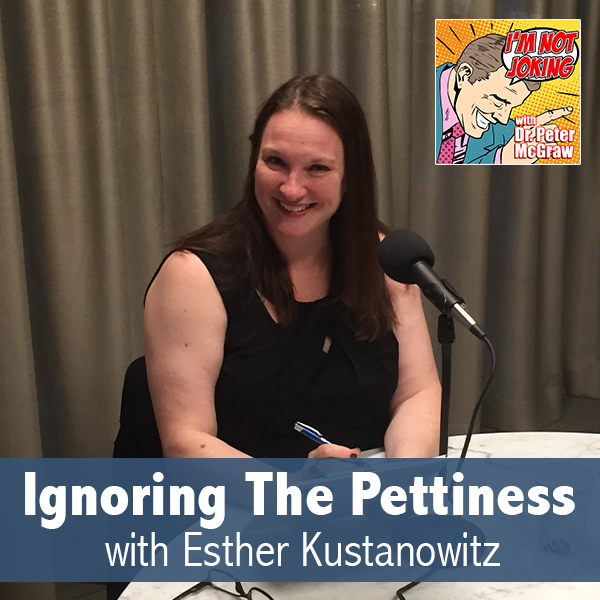 I love being a guest on podcasts. I’m not joking! And I’m definitely not joking about the fun I had being a guest on the I’m Not Joking Podcast.
I love being a guest on podcasts. I’m not joking! And I’m definitely not joking about the fun I had being a guest on the I’m Not Joking Podcast.
An honor to talk with behavioral scientist Peter McGraw about pop culture; comedy; when is #toosoon when it comes to joking about tragic events; comedy lessons for leadership; grief writing and so much more. Here’s a sample from the transcript (link to audio is below):
Peter McGraw: I do like this idea that we’re all supporting actors. The best improvisers embrace that idea is that if we all take on that role, we create something special where everybody has a chance to stand out, but it comes from someone else.
Esther Kustanowitz: “Also in life and community building, that’s the ideal as the feeling. It goes back to a Jewish concept, which I always have to arh back to because, hi, I’m me: the idea that we’re all responsible for each other. This is something that I’ve used when I’ve taught some improv workshops that are very basic improv rules in the context of short-form games, but also juxtaposed with principles of Jewish community building. Like, “we are all responsible for each other,” or you shouldn’t take yourself outside of the community. You should feel that you’re always a part of it. You don’t rely on a miracle. You give everything you can to a scene so that it goes. You don’t just wait for somebody to rescue you.
If we all viewed ourselves–whether we are the leaders or the followers, depending on whatever your community is, whether it’s an office environment or if it’s a youth group or social group–the idea that everybody’s an equal part of the group is not always assumed, and not always the operating point for a lot of people. The idea that there’s no leader of the group that like you’re part of the group, that everybody’s bringing their own stuff and their own brains to the group. Improv has also taught me if you have an idea for something and you’re working in a group context, it’s fine to have an idea but you also have to be open to other people’s ideas. If the idea that emerges that is better is not yours, you have to let go of your ego and go along with it.”
For more listen below.

Going Long with TVGoneJewy at Limmud Bay Area Festival
0I arrived at Sonoma State University for the Limmud Bay Area Festival, excited about presenting three sessions to the attendees. But there was one lurking worry: that my first presentation was too long.
I had 70 minutes to cover “TV Gone Jewy” – the exploration of various scenes from contemporary television that mentions Jewish things or talks extensively about Jewish identity. But I definitely had more than 70 minutes of material. I went through the presentation and trimmed – starting clips when the Jewy things happened instead of at their start to provide context, cutting slides here and there. I had also built in about ten minutes at the end for conversation. I could do it in 70 minutes, I thought.
As we met that Friday afternoon as the Jewish conference/festival, gathering several hundred community learners interested in unfiltered or unaffiliated Jewish learning, began, I looked out at the room, about 40 attendees of all ages, Jewish identities and backgrounds and breathed. Here we go.
I spoke quickly, in tribute to my east coast roots, and before I knew it we were at 60 minutes.
“How are we doing on time?” I asked the crowd. “Have a few more minutes?”
“Keep going!” the crowd urged.
“OK,” I said, “but if you need to leave to go to another session, or for whatever reason, we can officially end the session and if people want to stay, you’re welcome but not required. I’ll keep going for whoever stays!”
About five people walked out, waving, smiling and saying thank you. The rest of us continued…for another hour. About 25 people stayed to the very end.
That was just the beginning.

One Comedian Holds “Shiva for Anne Frank”; Another Roasts Her: The Challenges of Holocaust Comedy
0Anne Frank’s birthday is June 12. In honor of her life and work, I wanted to share two recent pieces I wrote about Anne, and take a look at some of the current media conversation about her.
Comedy and the Holocaust
The Holocaust is not funny. We all know that. And yet, there is comedy being performed about things associated with the Holocaust that some people do find funny. This line is a difficult one to walk and is explored very well and, I think, respectfully, in the documentary “The Last Laugh.” That film, containing jokes and serious interviews with comedians, makes points about Jews’ survival and ridiculing Nazis as taking away their power. (Trailer at end of this post.)
Roasting Anne Frank
This month, Netflix released a new series by Jeffrey Ross called “Historical Roasts,” including a “roast” of Anne Frank. The internet rebelled, with many calling on people everywhere to insist that Netflix cancel and remove the whole series. Most of these people had not seen the show and proudly proclaimed they wouldn’t even watch a few seconds of it in protest; they were rebelling in knee-jerk reaction to the sheer idea of a comedy roast of the beloved diarist. They didn’t understand Ross’s motivations, or they didn’t care. They thought the show was laughing at Anne Frank. (And the word “roast” in a Holocaust context is really in poor taste, but that’s what the genre is called.) But Ross said in a Jewish Journal interview that he was acting out of educational goals, but through a genre – comedy roasts in which the guest of honor is insulted by “friends” and then has an opportunity to fight back with their own insults – that he has become known for:
“As a comedian, you do things that no one’s ever done, and roasting Anne Frank sounds outlandish, it sounds risky, but to me, the riskier move would be to ignore the most provocative and the most emotional stories,” Ross said. “People always talk about the Holocaust and they say ‘never forget,’ but young people, I’m sorry, they are forgetting. They need to hear these stories, and I use Anne Frank not just as a hero from World War II but as a cautionary tale of today and anti-Semitism.”
Anne and Rachel at the Fringe
In this year’s Hollywood Fringe Festival, writer and comedian Rachel McKay Steele has a one-woman show about Anne Frank, or more accurately, about how her life is inspired by Anne Frank’s work. The show, “Shiva for Anne Frank,” got a little sexually explicit at parts, and is often more about the author than the diarist. It will undoubtedly elicit some knee-jerk reactions to the concept. But Steele points out that Anne herself, even within her dire circumstances, had a wry sense of humor. It’s possible she would have enjoyed a good roast, or Jewish comedians identifying with parts of her story or with the observations she made in her diary. As with the roasts, the ability to sit and absorb the culture of this show is about understanding the genre and suspending your inner critic to see the truths within, even if you find some of the trappings offensive.
Let’s Talk
So what role should contemporary tools – like social media and various types of comedy or commentary – play in retelling the sacred stories of our tragic past? Is it always going to be “too soon” to joke about tragedy? Are remembrances only permitted to be somber, or can we infuse serious memorials with humor?
Read “Chutzpah, Babka and ‘Shiva for Anne Frank,'” my interview with writer and comedian Rachel McKay Steele, in the Jewish Journal.
Read my piece, “Anne Frank Friended Me: Social Media and Remembering the Holocaust,” in eJewishPhilanthropy.
Trailer for “The Last Laugh” (2016)
EstherK Explains: Passover
0Need a crash course in Passover? Check out EstherK Explains Passover!

The Marvelous Mrs. Marketing–oops, I Meant “Maisel” (& more!)
0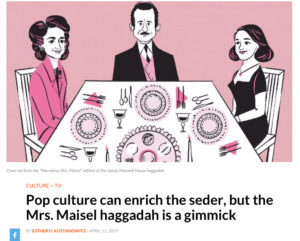 That’s right. I said it. I’m the grinch who stole Passover. I’m the “Marvelous Mrs. Maisel” fan who doesn’t want a Maisel-themed Haggadah for her Passover seder. But I do wish that when these religion-and-pop-culture mashups happen, that they do so in a way that enriches either the religious source material or the pop culture text, and this collector’s edition did neither–it was simply a marketing gimmick. The Maxwell House Haggadah is known for its accessible simplicity. And I can respect that, even if it’s not what I find meaningful during the Passover holiday. But I am the kind of person who likes to dive deep into culture and text, to look for meaning.
That’s right. I said it. I’m the grinch who stole Passover. I’m the “Marvelous Mrs. Maisel” fan who doesn’t want a Maisel-themed Haggadah for her Passover seder. But I do wish that when these religion-and-pop-culture mashups happen, that they do so in a way that enriches either the religious source material or the pop culture text, and this collector’s edition did neither–it was simply a marketing gimmick. The Maxwell House Haggadah is known for its accessible simplicity. And I can respect that, even if it’s not what I find meaningful during the Passover holiday. But I am the kind of person who likes to dive deep into culture and text, to look for meaning.
What might I have done instead? Try to look at the Maisel characters through a Passover lens. Take the Four Children: Wise, Wicked, Simple and Unable to Ask a Question…Midge Maisel (nee Weissman) spends years not knowing how to ask for what she wants, but then gets wise about it, rendering her wicked in the eyes of father, Abe, a wise man (phonetically, Weissman!) whose worldview is rigid and simple. Rose demands her daughter conform to a simpler life, but because she herself doesn’t know how to ask for what she wants, she flees her life (wicked?) and country to reconnect with an old path. And in the newest season, we find out that the son, living a life at a frequency that seemed much simpler than Midge’s, is using that simplicity as a cover for a complicated government life. Maisel characters–and people–are complicated.
For more about how I’d bring pop culture into the Four Children context, check out my latest in the J. And you can check out past pop culture/Passover pieces at my Haggadot.com author page (where you can make your own meaningful Haggadah!)
(Thanks for reading – will try to keep this space more updated in the future.)

May The Faiths Be With You: An Interfaith Star Wars Panel
0A Jew, a Christian and a Muslim walked into the Scum & Villainy Cantina in Hollywood to talk about the panel they were doing about Faith and Star Wars. And then, a few weeks later, they walked into a synagogue in Los Angeles, to do that panel on Faith and Star Wars!! This was fun! Check out the video excerpt of my opening comments below…

What have I been up to? Check out these handy author pages!
0It’s been a while since I’ve posted over here, but that’s because I’ve been busy writing up a storm in various places…the best way to catch my writing is usually at GrokNation.com or JewishJournal.com, so here are some handy author links to save you a Google. 🙂
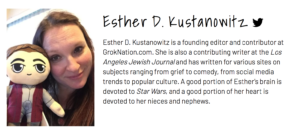 Looking for my TV, film and other pop culture pieces; social media commentary; or various news-related stories? GrokNation.com can help you with that. 🙂 Here are some recent Grok pieces I’m particularly proud of:
Looking for my TV, film and other pop culture pieces; social media commentary; or various news-related stories? GrokNation.com can help you with that. 🙂 Here are some recent Grok pieces I’m particularly proud of:
- Hollywood’s Scum & Villainy Cantina: where all fandoms are welcome
- The movie ‘Grease’ turns 40, and we’re conflicted
- Sarai Walker, author of ‘Dietland,’ on her book and the new AMC series
- May the faith be with you: Star Wars and religion
- In ‘I Feel Pretty,’ Amy Schumer’s traumatic brain injury leads to transformation
If it’s Jewish community stories or Jewish-thought-related articles that you fancy, the JewishJournal.com site is the one for you! Here are some of my newest pieces from the good ol’ JJ:
- Modern Jewish Matchmakers Urge Singles to Keep Their Hearts and Minds Open to Love
- The Jewish Geography of — and in — Auschwitz
- For Jewish Scholars Analyzing TV’s ‘Crazy Ex-Girlfriend,’ the Rest Is Commentary
- Twitter and the Responsibility of More
- MADE IN ISRAEL: How Israeli Shows Are Transforming Television
Thanks for stopping by – hoping to have a site revamp and/or more content here soon!!
